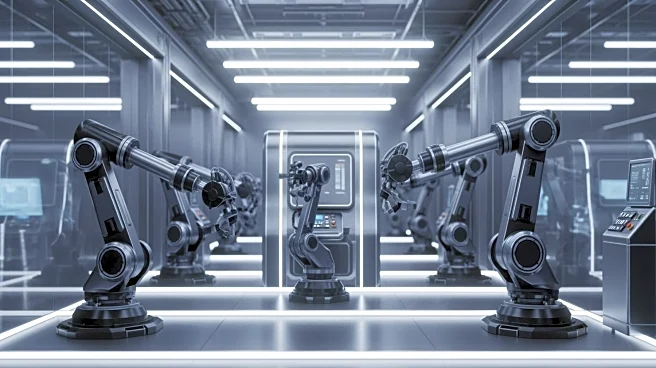What's Happening?
Holman Robotics, a new division of Holman, has been launched to provide comprehensive robotic management solutions aimed at transforming industrial operations. The company, based in Mount Laurel, New Jersey,
is offering an end-to-end service that integrates system design, flexible financing, and lifecycle asset management. This initiative is designed to simplify the deployment of robots and industrial automation at scale, addressing common barriers such as high upfront costs and technical complexities. Holman Robotics plans to collaborate with various innovators in the robotics sector to enhance its offerings.
Why It's Important?
The launch of Holman Robotics is significant as it addresses key challenges faced by businesses in adopting robotic automation. By offering a bundled solution that includes hardware, data integration, management software, and ongoing support, Holman aims to reduce complexity and accelerate the adoption of automation technologies. This could lead to increased efficiency and reduced operational costs for businesses, potentially transforming industries such as manufacturing, logistics, and healthcare. Companies that successfully integrate these solutions may gain a competitive edge through improved operational workflows and strategic decision-making.
What's Next?
Holman Robotics is expected to continue expanding its partnerships within the robotics sector to enhance its service offerings. As businesses begin to adopt these solutions, there may be increased demand for tailored robotics systems that align with specific operational goals. The company’s approach could set a precedent for other service providers in the industry, potentially leading to more comprehensive and accessible automation solutions. Stakeholders in various industries will likely monitor the impact of these services on operational efficiency and cost reduction.
Beyond the Headlines
The introduction of Holman Robotics may have broader implications for the robotics industry, including potential shifts in how companies approach automation. The focus on reducing barriers to entry could democratize access to advanced technologies, allowing smaller businesses to compete with larger enterprises. Additionally, the integration of data-driven insights into robotic management could lead to more informed strategic decisions, influencing long-term industry trends.










